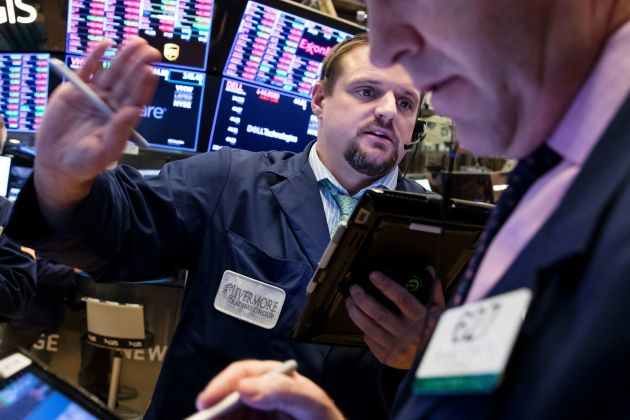
Stocks struggled on Wednesday as sharp losses in the health-care sector offset strong quarterly earnings results.
The Dow Jones Industrial Average dipped 3.12 points to 26,449.54, while the S&P 500 fell 0.2% to 2,900.45. The Nasdaq Composite closed 0.05% lower at 7,996.08. The Nasdaq 100, which is made up of the 100 largest companies in the composite index, rose 0.3% and hit a record high.
Health care fell 2.9% as a sector, eclipsing a 2% drop from the previous session.
“Health care is one of the poorest performers this year,” said Ernie Cecilia, CIO at Bryn Mawr Trust. “Some of it is political. The prospects from a regulatory perspective, certainly in managed care and some of the large pharmaceutical companies, is a question mark.”
The sector’s sharp losses came after UnitedHealth CEO David Wichmann warned that proposals pushed by Democratic lawmakers, such as “Medicare for All,” would “surely jeopardize the relationship people have with their doctors, destabilize the nation’s health system and limit the ability of clinicians to practice medicine at their best. ”
Wichmann’s comment sent UnitedHealth shares down 4% on Tuesday; they fell another 1.9% on Wednesday. Other health-care names like Alexion Pharmaceuticals and DaVita fell 8.1% and 7.7%, respectively.
Health-care names are now falling “under that umbrella of political uncertainty,” said Yousef Abbasi, director of U.S. institutional equities at INTL FCStone. “A lot of people are going to get more uncomfortable with the situation in managed care before they get comfortable with it.”
Stocks initially rose as investors cheered strong earnings from companies like Morgan Stanley and PepsiCo, along with better-than-expected economic data out of China.
Morgan Stanley shares rose 2.6% after posting earnings and revenue that topped expectations. The banking giant’s results were boosted by sales in its wealth management and fixed income trading divisions.
PepsiCo also reported stronger-than-forecast earnings as sales in its Frito-Lay business grew by 5.5%. The stock rose 3.8%. Rail transportation giant CSX, meanwhile, saw its stock rise 4% on the back of its quarterly results.
Overall, 84.6% of the S&P 500 companies that have reported calendar first-quarter earnings have topped analyst expectations, according to FactSet. This was a highly anticipated earnings season as analysts polled by FactSet expected corporate earnings to have fallen by 4.2% in the first quarter.
“Earnings growth was destined to slow in 2019, if for no other reason that tax cuts in 2018 made year/year comparisons tougher,” Ed Clissold, chief U.S. strategist at Ned Davis Research, said in a note. But “the odds of a 2015-type earnings decline appear low, making the risk of earnings causing a major market dislocation over the intermediate-term low.”
Not all stocks reacted positively to their quarterly reports, however. IBM reported better-than-expected earnings, but its stock fell 5.5% as its revenue fell for a third straight quarter. Netflix also fell 1.6% as its guidance for second-quarter earnings disappointed investors.
The Chinese economy grew by 6.4% in the first quarter of 2019, topping a Refinitiv estimate of 6.3%. Industrial production also surged 8.5% in March, surging past a 5.9% forecast.
The strong Chinese economic numbers assuaged fears that the global economy was slowing down. The data also pushed Citi to raise its 2019 GDP estimate to 6.6%.
“Our new baseline scenario is that a framework trade deal between the US and China will be reached in 2Q and it will lift most, if not all, existing punitive tariffs,” Citi economist Xiangrong Yu wrote. “Second, we see improved policy effectiveness in boosting domestic demand. The gov’t’s repeated messages to support private entrepreneurship and carry on market-oriented reforms have greatly reduced the policy uncertainty in China.
Qualcomm, meanwhile, rallied 12.3% — adding to a sharp rise in the previous session — as investors continued to cheer the chipmaker settling a lawsuit with tech giant Apple.
Qualcomm’s rally lifted the broader chipmaker space. The VanEck Vectors Semiconducto ETF (SMH) climbed more than 1%.
























